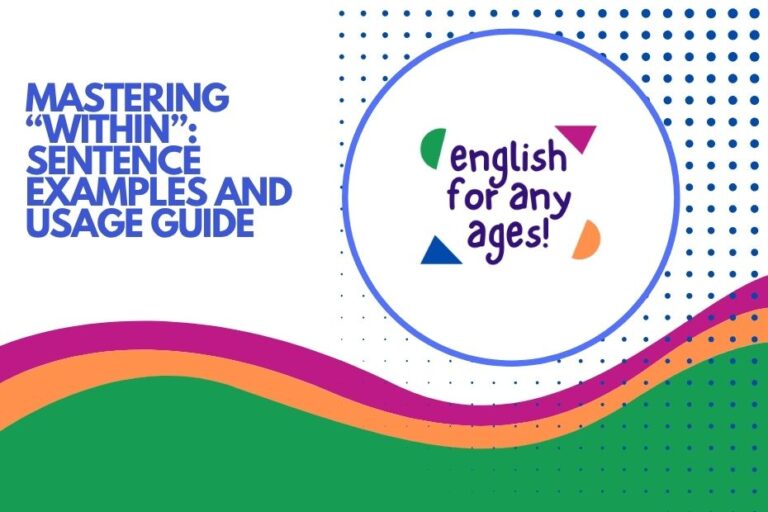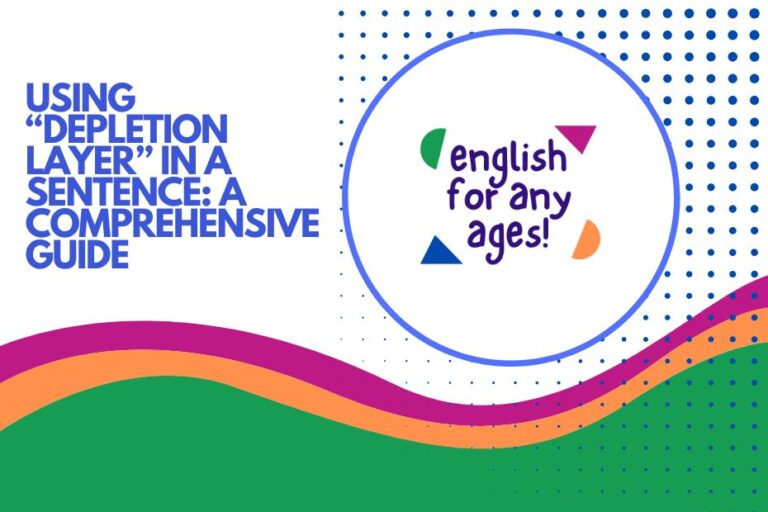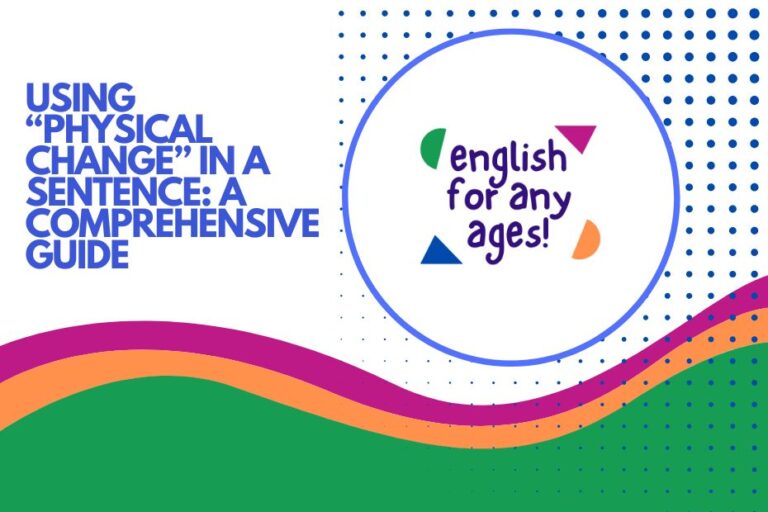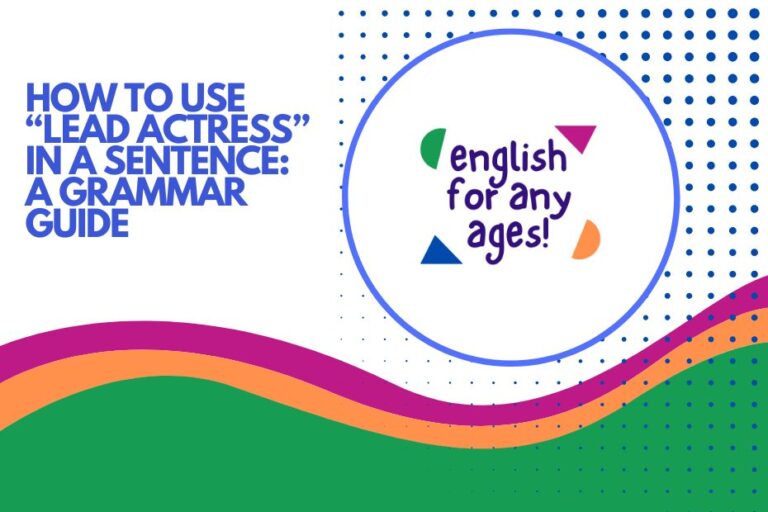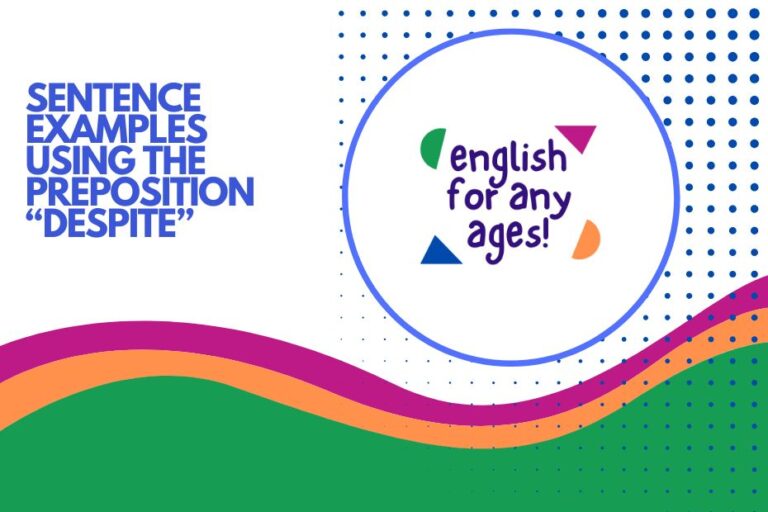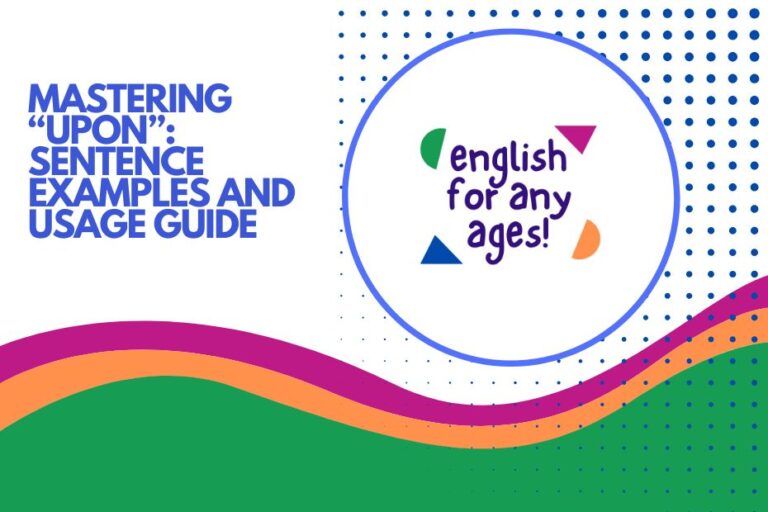Mastering “Beyond”: Sentence Examples and Usage Guide
The preposition “beyond” is a versatile word in the English language, conveying ideas of exceeding limits, being distant, or lying outside a specific range. Understanding its various uses is crucial for expressing complex thoughts and achieving clarity in writing and speech.
This article provides a comprehensive exploration of “beyond,” covering its definitions, structural roles, different categories of usage, numerous examples, common mistakes, and practice exercises. Whether you are a beginner or an advanced learner, this guide will equip you with the knowledge and skills to use “beyond” confidently and accurately.
Table of Contents
- Introduction
- Definition of “Beyond”
- Structural Breakdown
- Types and Categories of Usage
- Examples of “Beyond” in Sentences
- Usage Rules for “Beyond”
- Common Mistakes with “Beyond”
- Practice Exercises
- Advanced Topics
- Frequently Asked Questions
- Conclusion
Introduction
Mastering prepositions is essential for fluency and precision in English. The preposition “beyond,” in particular, adds depth and nuance to your language.
It allows you to express abstract ideas, spatial relationships, temporal concepts, and the exceeding of limits. This article aims to provide a thorough understanding of “beyond” through clear explanations, diverse examples, and practical exercises.
By the end of this guide, you will be able to confidently incorporate “beyond” into your writing and speech, enhancing your overall communication skills. This comprehensive resource is designed for English language learners of all levels, from beginners seeking a foundational understanding to advanced speakers aiming to refine their usage.
Definition of “Beyond”
The preposition “beyond” generally indicates something that is further away, outside the limits of, or greater than a specified thing or concept. It signifies a state or condition that extends past a physical boundary, conceptual boundary, or a point in time.
“Beyond” can function in several contexts, each adding a slightly different shade of meaning to a sentence. Its flexibility makes it a valuable tool for expressing a wide range of ideas.
Understanding these nuances is key to using “beyond” effectively.
Classification: Preposition
Function: Indicates a location, limit, time, or concept that is further away, outside of, or exceeds something else.
Contexts:
- Spatial: Indicating a physical location further away than a reference point.
- Metaphorical: Indicating something that is conceptually further away or outside of a certain realm.
- Temporal: Indicating a time that is later than a specified time.
- Limit Exceeded: Indicating that something exceeds a certain limit or boundary.
Structural Breakdown
The preposition “beyond” typically appears before a noun, pronoun, or noun phrase, forming a prepositional phrase. This phrase then modifies another element in the sentence, providing information about location, extent, or condition. The structure usually follows a simple pattern: Beyond + Noun/Pronoun/Noun Phrase. Understanding this basic structure is crucial for constructing grammatically correct sentences using “beyond.” The prepositional phrase acts as an adjective or adverb, adding detail to the sentence.
Examples:
- Beyond the mountains (spatial)
- Beyond my comprehension (metaphorical)
- Beyond midnight (temporal)
- Beyond repair (limit exceeded)
In more complex sentences, “beyond” can be part of a longer prepositional phrase, or it can be used in conjunction with other prepositions to express more nuanced meanings. However, the core structure remains the same: “beyond” introduces the element that is further, greater, or outside of something else.
Types and Categories of Usage
The preposition “beyond” can be categorized into several types based on its meaning and function in a sentence. These categories help to understand the various ways “beyond” can be used and to choose the appropriate usage for a given context.
Spatial “Beyond”
Spatial “beyond” refers to physical distance or location. It indicates that something is further away than a specific point of reference.
This is one of the most literal uses of “beyond” and is easily visualized. It helps to describe the relative positions of objects or places.
Examples:
- The village lies beyond the river.
- The forest extends beyond the horizon.
Metaphorical “Beyond”
Metaphorical “beyond” describes abstract concepts, ideas, or states that are outside of a certain realm or exceed a specific limit. This usage is more figurative and requires a deeper understanding of the context.
It often refers to intangible things like understanding, ability, or hope.
Examples:
- His actions were beyond forgiveness.
- The problem is beyond my understanding.
Temporal “Beyond”
Temporal “beyond” refers to time, indicating that something will happen or continue after a specific point in time. This usage is often used to express future events or durations.
It is useful for setting timelines and describing the sequence of events.
Examples:
- The store will be open beyond midnight.
- The effects of the medication last beyond the initial dose.
Limit Exceeded “Beyond”
This category of “beyond” indicates that something exceeds a specific limit, boundary, or expectation. It suggests that a certain threshold has been passed.
This usage is often used to express impossibility or the futility of action.
Examples:
- The damage to the car was beyond repair.
- His behavior was beyond acceptable.
Examples of “Beyond” in Sentences
To further illustrate the usage of “beyond,” here are extensive examples categorized by the types discussed above. Each category includes a variety of sentences showcasing the different ways “beyond” can be used.
Spatial Examples
The following table provides examples of “beyond” used to describe locations or physical distances. These examples demonstrate how “beyond” helps to establish spatial relationships between different places or objects.
| Sentence | Explanation |
|---|---|
| The garden extends beyond the fence. | The garden’s area is larger than what the fence encloses. |
| The path continues beyond the bridge. | The path’s route goes further than the bridge. |
| The mountains rise beyond the clouds. | The mountains are taller than the cloud level. |
| The sea stretches beyond the horizon. | The sea is so vast that it extends past the visible horizon. |
| The hidden treasure lies beyond the old oak tree. | The location of the treasure is past the oak tree. |
| The restricted area begins beyond the yellow tape. | You cannot pass the yellow tape. |
| The secret garden is located beyond the maze. | The garden is past the maze. |
| The hiking trail goes beyond the waterfall. | The trail continues past the waterfall. |
| Our property line extends beyond the creek. | The end of our property is past the creek. |
| The sound of the ocean carries beyond the dunes. | You can hear the ocean from past the dunes. |
| The abandoned cabin sits beyond the dense forest. | The cabin is in a location past the forest. |
| The ancient ruins are located beyond the valley. | The ruins are past the valley. |
| The stargazing spot is beyond the city lights. | The spot is past the interference of city lights. |
| The wildlife sanctuary starts beyond the riverbank. | The sanctuary is past the riverbank. |
| The best fishing spots are beyond the shallow waters. | The fishing spots are past the shallow waters. |
| The unexplored territory lies beyond the mountain range. | The territory is past the mountain range. |
| The emergency exit is located beyond the fire doors. | The exit is past the doors. |
| The picnic area is situated beyond the playground. | The area is located past the playground. |
| The quietest campsite is beyond the main campground. | The campsite is located past the campground. |
| The best view of the sunset is beyond the hilltop. | The best view is from past the hilltop. |
| The old mill is beyond the covered bridge. | The mill is past the bridge. |
| The apple orchard stretches beyond the barn. | The orchard is past the barn. |
| The sunflower field extends beyond the cornfield. | The sunflower field is past the cornfield. |
| The hiking trail winds beyond the lookout point. | The trail is past the lookout point. |
Metaphorical Examples
This table presents sentences using “beyond” to describe abstract concepts, emotions, or situations that are outside of a certain realm or exceed a specific limit. These examples illustrate the figurative use of “beyond.”
| Sentence | Explanation |
|---|---|
| Her kindness was beyond compare. | Her kindness was unmatched and exceptional. |
| The beauty of the music was beyond words. | The music was so beautiful that it could not be described. |
| His dedication to the project was beyond reproach. | His dedication was so strong it could not be criticized. |
| The actor’s talent is beyond question. | The actor’s talent is undeniable. |
| The level of stress was beyond manageable. | The stress was at an unmanageable level. |
| The potential for growth is beyond calculation. | The potential is too great to calculate. |
| The risks involved are beyond acceptable. | The risks are too great to accept. |
| The scope of the problem is beyond the initial assessment. | The problem is larger than initially thought. |
| The value of the artwork is beyond monetary worth. | The value of the art is more than just money. |
| The feeling of accomplishment was beyond description. | The feeling was too great to describe. |
| His loyalty to the company was beyond expectation. | His loyalty was greater than expected. |
| The implications of the decision are beyond immediate understanding. | The implications are hard to understand right now. |
| Her passion for the subject was beyond measure. | Her passion was immeasurable. |
| The impact of the event was beyond prediction. | The impact was hard to predict. |
| The benefits of the program are beyond dispute. | The benefits cannot be disputed. |
| The complexity of the issue is beyond simple solutions. | The issue is too complex for simple solutions. |
| The commitment to excellence is beyond compromise. | The commitment cannot be compromised. |
| The depth of his knowledge is beyond my comprehension. | His knowledge is too deep for me to comprehend. |
| The severity of the consequences is beyond imagination. | The consequences are unimaginable. |
| The level of detail in the report was beyond necessary. | The report had more detail than needed. |
| The reach of her influence is beyond geographical boundaries. | Her influence extends past geography. |
| The emotional toll was beyond what she could bear. | She could not bear the emotional toll. |
| The innovation in the field is beyond anything seen before. | The innovation is groundbreaking. |
| The possibilities are beyond limitless. | There are no limits. |
Temporal Examples
The following table showcases sentences where “beyond” is used to indicate a time that is later than a specified point. These examples demonstrate the temporal usage of “beyond.”
| Sentence | Explanation |
|---|---|
| The library is open beyond 9 PM on weekdays. | The library stays open later than 9 PM. |
| The concert will continue beyond midnight. | The concert will last past midnight. |
| The store offers support beyond the warranty period. | The support continues after the warranty expires. |
| The effects of the medicine may last beyond the initial dose. | The effects can continue after the first dose. |
| The validity of the ticket extends beyond the current date. | The ticket is valid for a later date. |
| The promotion is valid beyond the end of the month. | The promotion continues into the next month. |
| The deadline has been extended beyond Friday. | The new deadline is later than Friday. |
| The contract remains in effect beyond its initial term. | The contract continues after the initial term. |
| The memories will linger beyond the passage of time. | The memories will last a long time. |
| The significance of the event will be remembered beyond our lifetimes. | The event will be remembered for generations. |
| The investigation will continue beyond the initial timeframe. | The investigation will take longer than expected. |
| The training program offers ongoing support beyond the course completion. | Support is offered after the course is over. |
| The impact of the changes will be felt beyond the immediate future. | The changes will be felt for a long time. |
| The tradition will be carried on beyond our generation. | The tradition will be passed down. |
| The influence of the leader will extend beyond his tenure. | The leader’s influence will be felt for a long time. |
| The project’s benefits will be realized beyond the initial investment. | The benefits will continue long after the investment. |
| The legacy of her work will live on beyond her years. | Her work will be remembered for a long time. |
| The commitment to sustainability extends beyond short-term goals. | The commitment is long-term. |
| The effects of climate change will persist beyond our immediate actions. | Climate change will continue to affect us. |
| The need for continuous learning extends beyond formal education. | You need to learn past formal education. |
| The offer is valid beyond the expiration date if you call today. | The offer is valid past the date if you call today. |
| The warranty extends beyond one year if you register online. | The warranty is longer than a year if you register. |
| The membership benefits last beyond the initial subscription period. | The benefits last longer than the original time. |
Limit Exceeded Examples
This table provides examples of “beyond” used to express that something exceeds a specific limit, boundary, or expectation. These examples demonstrate how “beyond” can be used to indicate impossibility or the futility of action.
| Sentence | Explanation |
|---|---|
| The damage to the house was beyond repair. | The house was damaged so badly that it could not be fixed. |
| His behavior was beyond acceptable. | His behavior was not acceptable. |
| The cost of the project was beyond our budget. | The project was too expensive for us to afford. |
| The situation was beyond control. | The situation could not be controlled. |
| The task was beyond my capabilities. | I was not capable of doing the task. |
| The problem is beyond a simple solution. | The problem is too complex for a simple solution. |
| The pain was beyond endurance. | The pain was unbearable. |
| The consequences were beyond what we had anticipated. | The consequences were worse than we thought. |
| The level of difficulty was beyond my expectations. | The task was harder than I thought. |
| The situation is beyond help. | The situation is too far gone to be helped. |
| The demand for the product is beyond supply. | There is more demand than there is supply. |
| The scope of the investigation is beyond our resources. | The investigation is too large for us to handle. |
| The level of risk is beyond what we are willing to accept. | The risk is too high for us. |
| The challenge is beyond our current expertise. | The challenge is too hard for us. |
| The complexity of the code is beyond my understanding. | I don’t understand the code. |
| The wait time is beyond reasonable. | The wait time is too long. |
| The level of noise was beyond tolerable. | The noise was too loud. |
| The pressure to succeed was beyond what he could handle. | He could not handle the pressure. |
| The expectation was beyond realistic. | The expectation was not realistic. |
| The damage was beyond economical repair. | The damage was too expensive to fix. |
| The workload is beyond manageable for one person. | The workload is too heavy for one person. |
| The competition is beyond fierce. | The competition is very fierce. |
| The confusion was beyond resolution. | The confusion could not be resolved. |
Usage Rules for “Beyond”
Using “beyond” correctly involves understanding its grammatical function and the contexts in which it is appropriate. Here are some key usage rules:
- Placement: “Beyond” is typically placed before a noun, pronoun, or noun phrase.
- Context: Ensure that the context clearly indicates whether you are referring to physical distance, abstract concepts, time, or exceeding limits.
- Clarity: Use “beyond” in a way that enhances clarity and avoids ambiguity. If the meaning is unclear, rephrase the sentence.
- Formal vs. Informal: “Beyond” is suitable for both formal and informal contexts.
Exceptions and Special Cases:
- “Beyond” can sometimes be used as an adverb, though this is less common. Example: “The noise carried far beyond.”
- In some cases, “beyond” can be part of a phrasal verb, such as “go beyond,” which means to exceed or surpass.
Common Mistakes with “Beyond”
Even experienced English speakers sometimes make mistakes with “beyond.” Here are some common errors and how to correct them:
| Incorrect | Correct | Explanation |
|---|---|---|
| The house is farer than the river. | The house is beyond the river. | “Farer” is not the correct word to use with the meaning of “beyond.” |
| The problem is over my head. | The problem is beyond my understanding. | “Over my head” is an idiom, but “beyond my understanding” is more precise. |
| The time is after midnight. | The event will take place beyond midnight. | “After midnight” is correct, but “beyond midnight” emphasizes the extended duration. |
| The damage was too much to repair. | The damage was beyond repair. | “Beyond repair” is a more concise and idiomatic way to express the impossibility of repair. |
| The limit is exceeding. | The results were beyond the initial limit. | “Beyond” is used to show the results were over the limit. |
Practice Exercises
Test your understanding of “beyond” with these practice exercises. Choose the correct sentence using “beyond” or rewrite the sentence using “beyond.”
Exercise 1: Multiple Choice
| Question | Options | Answer |
|---|---|---|
| The mountains are _______ the valley. | a) over b) beyond c) under | b) beyond |
| His actions were _______ forgiveness. | a) within b) beyond c) inside | b) beyond |
| The store will stay open _______ 10 PM. | a) until b) beyond c) before | b) beyond |
| The damage was _______ repair. | a) in b) beyond c) under | b) beyond |
| The city lies _______ the hills. | a) beside b) beyond c) nearby | b) beyond |
| Her achievements are _______ impressive. | a) beyond b) under c) within | a) beyond |
| Our commitment stretches _______ this project. | a) inside b) beyond c) below | b) beyond |
| This is _______ my comprehension. | a) below b) beyond c) next to | b) beyond |
| The trail continues _______ the waterfall. | a) beneath b) beyond c) before | b) beyond |
| The expiration date is _______ next month. | a) before b) beyond c) during | b) beyond |
Exercise 2: Sentence Completion
Complete the following sentences using “beyond” appropriately.
- The forest stretches ____________________. (Answer: beyond the horizon)
- Her influence extends ____________________. (Answer: beyond her immediate circle)
- The cost was ____________________. (Answer: beyond our initial estimate)
- The effects of the drug lasted ____________________. (Answer: beyond the expected duration)
- The secret is ____________________. (Answer: beyond my knowledge)
- His potential is ____________________. (Answer: beyond measure)
- The results were ____________________. (Answer: beyond our wildest dreams)
- The challenge is ____________________. (Answer: beyond our current capabilities)
- The consequences are ____________________. (Answer: beyond imagination)
- The support continues ____________________. (Answer: beyond the warranty period)
Exercise 3: Sentence Rewriting
Rewrite the following sentences using “beyond.”
- The village is further than the river. (Answer: The village is beyond the river.)
- His actions were too much to forgive. (Answer: His actions were beyond forgiveness.)
- The store will stay open later than midnight. (Answer: The store will stay open beyond midnight.)
- The damage was impossible to repair. (Answer: The damage was beyond repair.)
- The situation was out of control. (Answer: The situation was beyond control.)
- The task was more than I could do. (Answer: The task was beyond my capabilities.)
- The problem is too hard for a simple solution. (Answer: The problem is beyond a simple solution.)
- The pain was too much to endure. (Answer: The pain was beyond endurance.)
- The consequences were worse than we thought. (Answer: The consequences were beyond what we anticipated.)
- The level of difficulty was higher than I expected. (Answer: The level of difficulty was beyond my expectations.)
Advanced Topics
For advanced learners, “beyond” can be explored in more complex grammatical structures and idiomatic expressions. This includes understanding its use in compound sentences and its role in nuanced writing.
- Beyond in Compound Sentences: “Beyond” can be used to connect related ideas in compound sentences, adding depth to your writing.
- Idiomatic Expressions: Understanding idiomatic expressions involving “beyond” can further enhance your fluency and comprehension.
- Nuanced Writing: Using “beyond” strategically can add subtlety and sophistication to your writing, allowing you to express complex ideas with precision.
Frequently Asked Questions
Here are some frequently asked questions about using “beyond.”
- Is “beyond” always used as a preposition?
While primarily a preposition, “beyond” can occasionally function as an adverb, though this is less common. Its main role is to connect a noun or pronoun to the rest of the sentence, indicating location, extent, or condition.
- What is the difference between “beyond” and “after”?
“Beyond” implies a further distance or extent, while “after” simply indicates a sequence in time or order. “Beyond” suggests exceeding a limit or boundary, whereas “after” denotes what comes later.
- Can “beyond” be used with uncountable nouns?
Yes, “beyond” can be used with uncountable nouns to express concepts like “beyond comprehension” or “beyond measure.” It is versatile and adaptable to various noun types.
- How do I avoid ambiguity when using “beyond”?
To avoid ambiguity, ensure that the context of your sentence clearly indicates the intended meaning of “beyond.” Rephrase the sentence if the meaning is unclear or if it could be interpreted in multiple ways. Consider the other words in the sentence and their relationship to “beyond.”
- What are some common synonyms for “beyond”?
Common synonyms for “beyond” include “past,” “further than,” “outside of,” and “exceeding.” The best synonym to use depends on the specific context and the nuance you want to convey.
- Is it correct to say “beyond of”?
No, it is generally incorrect to use “beyond of.” The correct usage is simply “beyond” followed by the noun or noun phrase. Adding “of” is grammatically incorrect in most contexts.
- How can I improve my understanding of “beyond” in different contexts?
Reading widely and paying attention to how native English speakers use “beyond” is a great way to improve your understanding. Practice using “beyond” in your own writing and speech, and seek feedback from others to identify any errors or areas for improvement. Pay attention to the context and the specific meaning that “beyond” conveys in each situation.
- Can “beyond” be used in formal writing?
Yes, “beyond” is appropriate for both formal and informal writing. It is a versatile preposition that can be used in a variety of contexts, from academic papers to casual conversations. However, always consider your audience and the overall tone of your writing when choosing your words.
Conclusion
The preposition “beyond” is a powerful tool for expressing a wide range of ideas in English. From describing physical locations to conveying abstract concepts and temporal relationships, “beyond” adds depth and precision to your language.
By understanding its various uses and following the usage rules outlined in this guide, you can confidently incorporate “beyond” into your writing and speech. Remember to practice regularly and pay attention to the context in which “beyond” is used.
With consistent effort, you will master “beyond” and enhance your overall communication skills.

